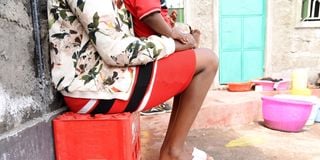Teen pregnancy: Taveta parents, community urged to take charge

More than 1,500 girls got pregnant in Taita Taveta County in 2020 according to National Council of Population and Development.
What you need to know:
- A total of 1,494 girls aged 15-19 years from Taita Taveta County were reported pregnant in 2020, while 40 girls aged between 10-14 years were impregnated between January and December last year.
- According to the data, the months of July and June recorded the highest numbers of pregnancy cases with 165 and 149 cases respectively.
- A community volunteer Ms Oyera said some parents neglected their roles and left their children to roam freely instead of engaging them in productive activities.
The Covid-19 pandemic has changed the lives of dozens of young women in Taita Taveta County. More than 1,500 girls got pregnant in 2020 according to National Council of Population and Development (NCPD).
The data shows that 1,494 girls aged 15-19 years were reported pregnant within that period while 40 girls aged between 10-14 years were impregnated between January and December last year.
Stakeholders have blamed the surge of adolescent pregnancies on the closure of schools due to the Covid-19 pandemic and lack of sex education at home.
According to the data, the months of July and June recorded the highest numbers of pregnancy cases with 165 and 149 cases respectively.
The surge in teen pregnancies among school going girls has raised concerns over the safety of girls while at home with their parents.
“We attribute this to Covid-19 pandemic that led to closure of schools from March to December," said NCPD Coast region coordinator Stephen Mulinge during a journalists’ training on population and development in Mwatate.
Home safety
A community volunteer in charge of sex education and awareness, Ms Fatuma Oyera noted that when schools closed in March last year to prevent the spreading of Covid-19 disease, no measures were put in place to ensure that children were safe at home.
She said the school closure resulted in girls spending more time with men and boys than they would were they in school.
"This led to higher chances of them engaging in risky sexual behaviour and increased risk of sexual violence and exploitation," she explained.
Ms Oyera said some of the parents neglected their roles and left their children to roam freely instead of engaging them in productive activities.
She noted that some of the girls even lacked sanitary towels, forcing them to engage in sexual activities to get money for pads.
Various groups came out to conduct sex education in the communities during the lockdown period to prevent girls from getting pregnant.
"We tried to come up with campaigns to create awareness on reproductive health and distributed pads to these girls. In my opinion, we started the programmes when the damage had already been done," she said.
She, however, noted that the government and other stakeholders need to come out strongly and engage campaigns to save the girls from early pregnancies.
Reports indicate that some of the perpetrators are close family, friends or community members who are well known to the victims.
She said the local community must also protect children from men who are out to destroy the lives of the young girls.
"This is a wakeup call to the society at large to ensure that we protect our girls. It should not be a fight involving the government and NGOs alone, but the local communities should know that it's their responsibility too, to take care of our girls," she said.
Child marriages
Cases of child marriages and teenage pregnancies are not new in the area.
"The cases were there but became more common when schools closed due to the Covid-19 pandemic," she said.
The government through its various agencies and stakeholders including non-governmental organisations have been in the forefront fighting against gender-based violence (GBV) to bring down the numbers and provide a safe space for women and girls in the county.
The office of the county Woman Representative is fundraising to construct a Sh40 million rescue centre for GBV victims.
Once fully operational, it will offer mental health support, food, legal and medical care to the GBV survivors.
Speaking recently during a women caucus forum at Voi Wildlife Lodge, woman representative Lydia Haika said Sh9.3 million has already been set aside to kick-start the project.
"Gender-based violence cases are rising and we are stuck with how to safeguard victims from the perpetrators. We are losing many cases due to lack of such facilities," she said.
The county government has already committed to assume responsibility of running the centre once construction is completed. The devolved unit is also in the process of formulating a policy on sexual and gender-based violence to curb the vice.
County commissioner Ms Rhoda Onyancha has been urging leaders and stakeholders to prioritise the issue to end violence against women and girls.
The commissioner said Taita Taveta reports at least six cases of GBV weekly, which has made the county lead in the Coastal region.
“There's need for leaders including politicians here, to ensure victims get support and justice and guarantee proper punishment for the perpetrators," she said.





